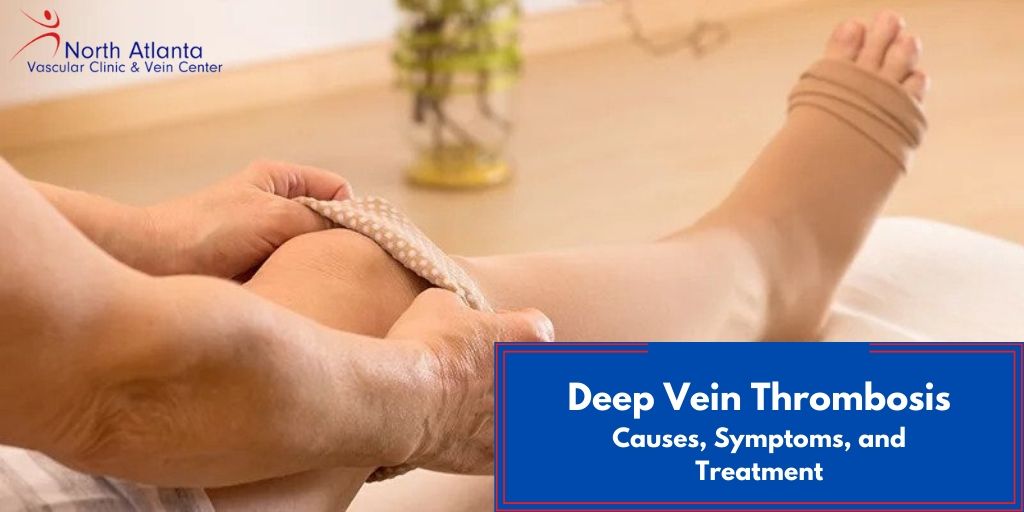Deep Vein Thrombosis (DVT) is a medical condition that deserves our attention, as it can be more common than you might think. In the United States alone, it is alarmingly widespread, with statistics from the Centers for Disease Control and Prevention (CDC) estimating that approximately 900,000 Americans are diagnosed yearly. This vascular condition leads to the formation of blood clots in deep veins, most frequently found in the veins of the pelvis, calf, or thigh.
Deep vein thrombosis is a condition that can often go unnoticed until it becomes a serious health concern. It can lead to severe complications if left untreated. Thus, it is crucial to understand the condition, its causes, and how it occurs in the veins to prevent its onset and the potential complications it brings. Keep reading to find out everything about DVT.
How DVT Occurs in Veins?
Understanding DVT begins with recognizing how it occurs in our veins. Deep vein thrombosis emerges when blood clots, medically known as thrombi, form in deep veins, usually in the lower extremities. These clots obstruct the normal flow of blood, leading to swelling and pain in the affected area. The most challenging consequence of it is when a clot breaks free and travels through the bloodstream, lodging in the pulmonary arteries, a condition called pulmonary embolism.
Causes of DVT
DVT typically arises from a combination of factors, including:
- Pregnancy: Being pregnant or having recently delivered a baby is one of the causes.
- Hypercoagulable Conditions: Certain medical conditions, like cancer and inherited clotting disorders and varicose veins, can increase the likelihood of clots.
- Inactivity: Being still for long amounts of time, such as during long flights especially sitting crossed legs or bed rest after surgery, increases the risk of clot formation.
- Surgery and Hospitalization: Major surgery or hospitalization for medical conditions can elevate the risk of DVT.
Risk Factors for Deep Vein Thrombosis
Several risk factors can increase the likelihood of DVT.
- Family History: A family history of DVT or clotting disorders may increase an individual's risk.
- Birth Control or HRT: Taking contraceptive pill or HRT may increase estrogen and can increase the risk DVT.
- Smoking: Smoking has detrimental effects on blood vessels, making clot formation more likely.
- Age: The risk increases with age, and in older age, men have a slightly higher risk than women, especially for those over 45 years old.
- Obesity: Excessive body weight puts additional pressure on veins, making clot formation more probable.
Common DVT Symptoms & Signs
Recognizing the signs and symptoms of deep vein thrombosis is essential for early intervention.
- Swelling: The affected leg usually becomes visibly swollen and tender.
- Pain: It often manifests as a deep, aching pain, occasionally mistaken for a muscle cramp.
- Warmth and Redness: The affected area may feel warm to the touch and appear red or discolored.
- Vein Hardening: Sometimes, the affected vein becomes firm or cord-like to the touch.
Medical Diagnosis of Deep Vein Thrombosis
When experiencing symptoms or recognizing potential risk factors, it is important to seek immediate medical attention. Healthcare professionals perform various diagnostic tests, including:
- Doppler Ultrasound: A non-invasive imaging test that uses sound waves to visualize blood flow and detect clots.
- Venography: A contrast dye is injected into a large vein, and X-rays are taken to identify clot location.
- D-dimer Blood Test: Measures the presence of a substance released when a blood clot breaks up.
Treatment Plan for Deep Vein Thrombosis
The treatment of DVT is multi-faceted, typically encompassing the following.
- Anticoagulants: Blood-thinning medications are prescribed to prevent further clot formation and reduce the risk of complications.
- Thrombolytics: These medications are used in severe cases to dissolve existing clots.
- Compression Stockings: Wearing compression stockings can help alleviate swelling and pain while improving blood flow.
- Vena Cava Filters: In situations where anticoagulants are not advisable, a filter may be placed in the vena cava to prevent clots from reaching the lungs.
- Surgery: Surgery is performed to remove blood clots or stop them from forming. This treatment option is used only for severe cases.
Measures & Tips for Prevention
Preventing DVT should be a priority, particularly for those at increased risk. You can follow these tips and measures to reduce the severity of this vascular condition.
- Stay Active: Regular exercise and frequent leg movements, especially after sitting for long periods, can help to prevent clot formation.
- Stay Hydrated: Adequate hydration helps maintain blood flow and prevents clot formation.
- Maintain a Healthy Weight: Weight management reduces the pressure on your veins.
- Refrain from Intoxicants: Avoid consuming alcohol or smoking as it can adversely affect your vein health.
- Wear Compression Stockings: Consult your healthcare provider about the need for compression stockings, particularly during long flights or if you have a history of clots.
Importance of Medical Help for Deep Vein Thrombosis
Understanding when to seek medical attention can be a life-saver. If you experience symptoms or possess risk factors, do not delay seeking medical attention. Timely diagnosis and treatment can prevent potentially life-threatening complications.
Expert DVT Care at North Atlanta Vascular Clinic in Suwanee/Johns Creek, GA
Deep vein thrombosis (DVT) is a serious medical condition that may develop without causing symptoms but requires immediate attention. Knowing what to look for, and the related risk factors may help you get the help you need quickly. Our experienced team at North Atlanta Vascular Clinic specializes in DVT treatment and can get you the expert care you need. Call us today to learn more about our services.
Content Source: CDC, NIH
